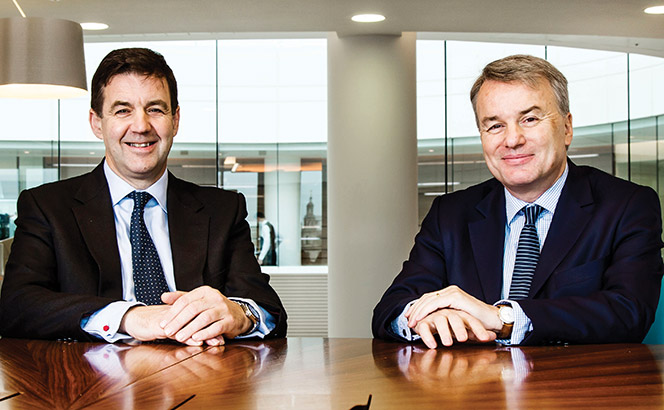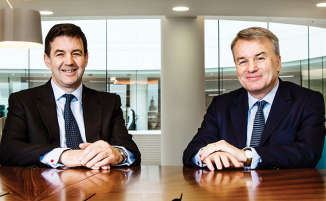The headline of the last lengthy piece Legal Business carried on Freshfields Bruckhaus Deringer said it all: The Last Champions. While there is no doubt that the Magic Circle has faced huge challenges asserting itself since the banking crisis, for many Freshfields was the member of the club with the best prospect of securing its place in the global elite.
But the City giant will be faring much worse on the profession’s saloon bar test if it keeps generating headlines like this summer, notably the news in July that co-managing partner Chris Pugh was stepping down less than halfway through his term. This surprise announcement came in the same month as financial results showed Freshfields being comprehensively outclassed by its City peers. Freshfields’ revenues have grown by just 17% in five years and the firm has been a fitful performer for nearly a decade now. While the metrics look better in profitability and revenue-per-lawyer terms, Freshfields has certainly not outpaced London rivals even on its core targets.
Of the two announcements, the departure of Pugh is the more damaging, representing the second loss to its c-suite in 18 months with executive partner Michael Lacovara quitting for Latham & Watkins in 2016. Sensitivities over departing leadership at Fleet Street are already considerable given the resignation of managing partner Ted Burke part-way through his term in 2013.
Many internally see the move as reflective of tensions between senior partner Edward Braham and Pugh, respectively former heads of corporate and dispute resolution who both stood in 2015 for senior partner before running as a joint ticket. Under this reading there has been discord between Freshfields’ heritage as a transactional firm and Pugh’s track record in substantially building up its disputes, antitrust and arbitration practices, with the deal junkies reasserting themselves. Aside from losses in arbitration with the 2014 launch of boutique Three Crowns, the firm has seen a number of its brand-name disputes veterans retire or move on, such as Ian Terry, Jon Lawrence and Raj Parker. Many doubt that Pugh will remain, while it has been noted that with Burke’s departure the contentious practice lost a powerful advocate. The internal response is that disputes remains as core as ever and will be receiving fresh investment, while the work of standout partners in their prime like James Kennedy and Mastercard pointman Mark Sansom is highlighted.
In the words of one insider on the departure of Pugh from senior leadership: ‘Management was aware of the seriousness of the situation, but the view was taken that it was right for the firm.’
Yet questions over management persist. While the pairing of senior partner Will Lawes and Burke was much admired, there are more mixed views on the current leadership. In part this is linked to the unresolved debate from the 2015 election when the rival joint ticket of Simon Marchant and Klaus-Stefan Hohenstatt promised more of the radical change that many argue is needed to keep pace with more profitable US rivals. Some felt the cerebral Braham is too conservative for an institution that has previously reinvented itself with much success when required.
Though there were personal reasons behind Lacovara’s departure – and his forthright style jarred with some – the loss of a high-performing ex-Sullivan & Cromwell partner who got things done was a blow to Freshfields’ leadership team and US credibility.
So it looked particularly bad to have Pugh stand down. Bad but necessary, as tensions had built up with Braham and other members of the leadership team. Contrary to some suggestions, such discord was focused on style and chemistry not Pugh being held responsible for sluggish trading. In the words of one insider on the departure of Pugh from senior leadership: ‘Management was aware of the seriousness of the situation, but the view was taken that it was right for the firm.’
Likewise, the 2016/17 results have been received poorly internally even in the context of a firm focused on profitability and quality of business over revenue growth. With several large disputes ending and an indifferent run of big-ticket deal work, the year ended far worse than expected. Sure, Freshfields has shrunk its partnership from 474 a decade ago to around 400 currently but it did not expect to get its clock cleaned this year by Clifford Chance (CC). (The mood will not have been helped this month by losing out on a DC disputes team to CC.)
As such the message internally is that events of recent months are being taken as a wake-up call for a firm in danger of losing its hard-fought position. But is Freshfields ready to take the hard decisions on reshaping its business, still most pressingly in the battle to secure a meaningful US breakthrough and in facing up to the reality that the firm needs substantial reform to its lockstep pay model? There is talk of Braham shedding some of his initial caution but he stood on a ‘lockstep good’ platform. Freshfields is also attempting the very tricky balance of progressing its business while continuing to shrink its partnership.
Now is certainly the moment for Freshfields to rediscover its strategic daring. Perhaps the last chance. The ‘Last Champions’ of the Magic Circle should remember that brand is a lagging indicator – and Freshfields has not done well enough since the banking crisis to make good on its global ambitions. Its platform and reputation for quality remain formidable assets. Alone, they will not be enough.













